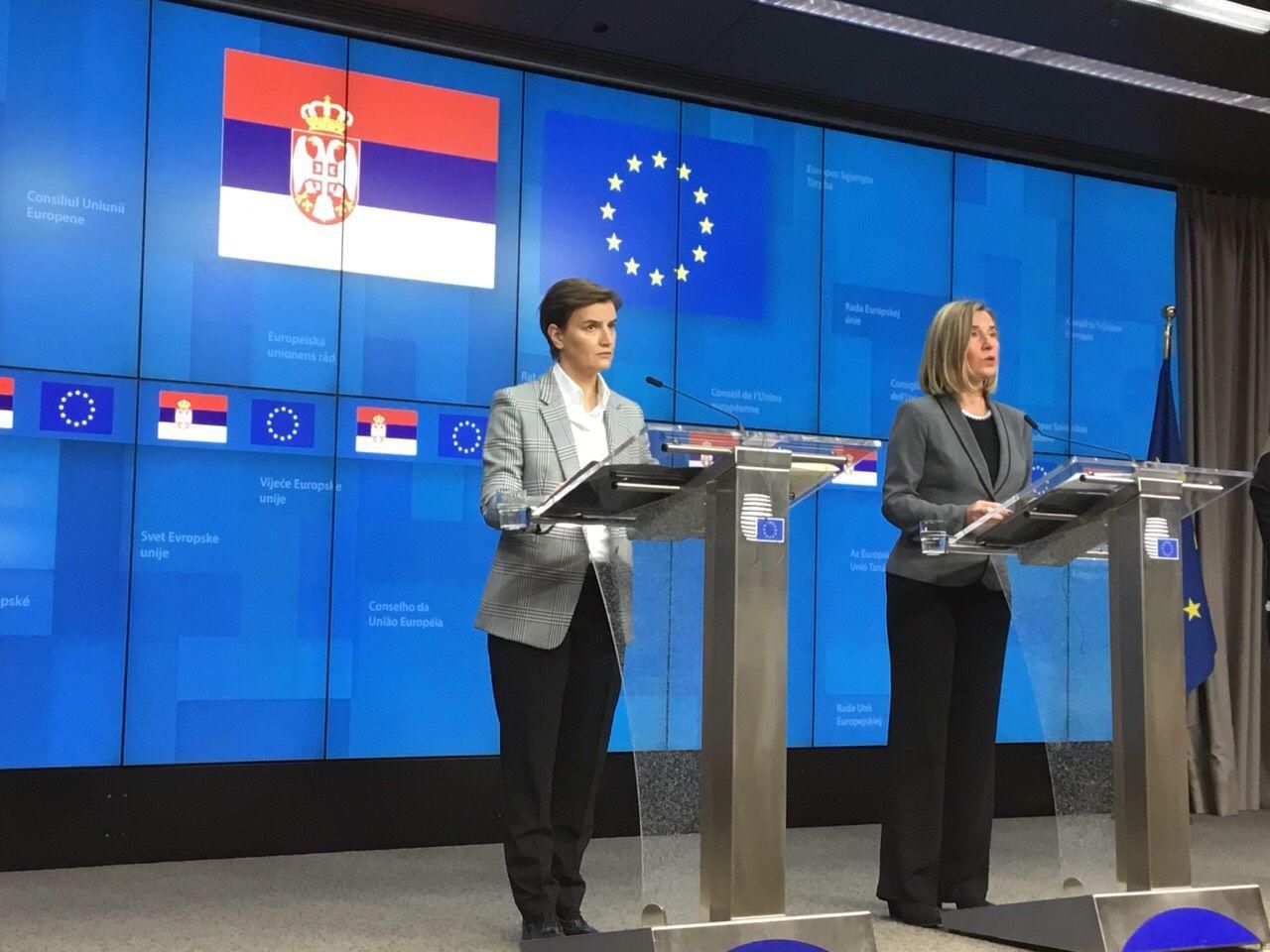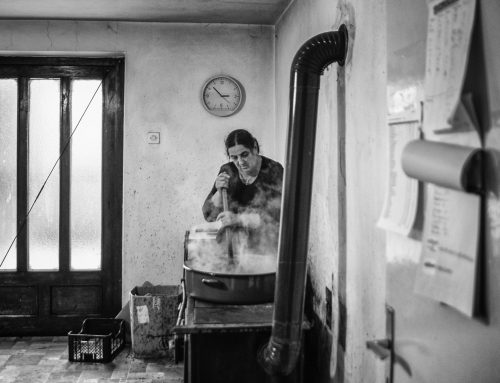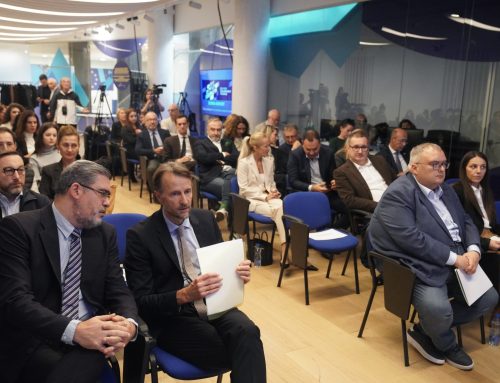Check against delivery!
I am very pleased to welcome the Prime Minister [of Serbia], dear Ana [Brnabić] again in Brussels, together with her team. We have just held the 5th meeting of the Stabilisation and Association Council between the European Union and Serbia.
This Council is always a good opportunity to look at where we are in the relations between the European Union and Serbia, and let me say that the assessment today is clearly that these relations remain very strong, very intensive and very positive.
I always repeat that I consider all of the Western Balkans and obviously Serbia as being already part of Europe. What we are discussing and what we are working on here is not how to integrate Serbia into Europe which it already is, but how to integrate Serbia into the European Union.
Looking at what we have done together since we last met here in November last year, the commitment on both sides is loud and clear.
We issued the Western Balkans Strategy during the course of this year, underlining the European Union clear commitment to support the political, economic and social transformation of the region, and with concrete deliverables on different sectors like connectivity, security and migration. We then had a EU-Western Balkans Summit in Sofia – fifteen years after the previous one in Thessaloniki – where the main priorities of the [Western Balkans] Strategy were endorsed by both the European Union and the Western Balkans’ leaders.
We have now all the necessary tools at hand to make further, irreversible progress on the EU perspective of the entire region and in particular on Serbia’s European Union path by the end of the mandate of this Commission – I believe these steps can be made irreversible and can advance at an even greater pace.
This is my clear goal. This is also a shared European Union commitment, as repeated on a number of occasions by the Council.
Serbia’s accession negotiations are moving forward. Last week, as you know, during the Intergovernmental Conference a further two chapters were opened, bringing the total to sixteen chapters opened and two provisionally closed.
I strongly believe that we could proceed even faster. The pace of the negotiations depends on the pace at which Serbia implements reforms in all different areas that are relevant for the European Union accession. Let me be very clear: we welcome enormously – and I welcome the personal commitment of the Prime Minister [of Serbia, Ana Brnabić] expressed today – the continued commitment of the Serbian government and of the Serbian people, to their strategic goal of European Union accession.
I am confident that the Prime Minister’s commitment and engagement will bring further progress in the key areas of rule of law, elections, parliamentary oversight and freedom of expression.
Serbia’s commitment to normalisation of its relations with Kosovo is also key for the progress of accession negotiations.
The European Union expects Serbia and Kosovo to swiftly deliver on their commitment to the Dialogue, given the direct link between comprehensive normalisation of relations between them and the concrete prospects for their respective European Union aspirations.
In this respect, let me comment the recent decision of the Kosovo Government on 100% tariffs targeting products from Serbia and from Bosnia-Herzegovina. The European Union’s message, my message, Commissioner [for European Neighbourhood Policy & Enlargement Negotiations Johannes] Hahn’s and Commissioner [for Trade, Cecilia] Malmström’s message has been clear from the very beginning: this measure is a breach of CEFTA [Central European Free Trade Agreement] and of the spirit of the SAA [Stabilisation and Association Agremeent]. It is in the interest of Kosovo to immediately revoke these decisions.
Grievances should be addressed through the Dialogue which the European Union and I personally am fully committed to continue to facilitate, and in general terms through the channels provided in the frameworks at hand.
Let me also add a remark on one extremely important area of our cooperation with Serbia – security and foreign policy. Serbia is a very important partner for the European Union when it comes to Common Security and Defence Policy. We particularly appreciate Serbia’s contribution to four military missions and operations of the European Union, in Mali, in the Central African Republic and in Somalia. We also welcome Serbia’s ongoing preparations to participate in European Union civilian missions.
This said, in line with its accession negotiations framework, we also expect Serbia to progressively align with the European Union Common Foreign Security Policy.
To conclude, let me say that I am optimistic about the European Union future of Serbia, and I trust that through our joint common work, Serbia will be able to progress even faster, which I see very clearly, is a strong demand of the citizens of the country.
Dear Ana [Brnabić], let me thank you again for your leadership, your dedication and commitment to the reform agenda, to the European Union perspective of your country and let me ensure you that you will always have here partners and friends ready to do every single step of the way together with you.
Link to the video: https://ec.europa.eu/avservices/video/player.cfm?ref=I165735
Q. I noticed yesterday afternoon you had talks with the Kosovo Prime Minister but no press conference afterwards, and today we are having this press conference. What should we read into that, was that any sign of your displeasure at the Kosovo position recently? What is your message today to Prime Minister [of Serbia, Ana] Brnabić on the issue of Kosovo and the proposal of the army and so on. Was it a message to carry on, or exercising restraint or what was it?
I do not think you need to read between the lines to know what I think of different things. My statements are always very clear and I reiterated it just now – that is not just my opinion but it is the European Union position, the Member States’, and the Commission position. The introduction of 100% tariffs is a clear violation from the side of Kosovo of the Central European Free Trade Agreement. It is also a clear violation of the spirit of the Stabilisation and Association Agreement between the European Union and Kosovo, and we have repeatedly invited and asked the Kosovo government to revoke this decision. We asked to revoke it already when it was 10%, now even more so.
This is not a secret, it was clearly mentioned in my statements and in Commissioner [Johannes] Hahn’s statements. We jointly addressed a letter – myself, Commissioner [Johannes] Hahn and Commissioner [Cecilia] Malmström – to propose to both Kosovo and Serbia to facilitate talks on any trade dispute that needs to be addressed in the form of dialogue and not imposing tariffs that are in breach of our Free Trade Agreements.
This discontent, this displeasure as you put it, was very clear from the beginning. The reason why we agreed with the Prime Minister [of Kosovo, Ramush Haradinaj] yesterday not to hold a press conference was because we agreed that we did not have any news to give you. Everything that we had said publicly was reconfirmed during the meeting and we had nothing to add to that.
When it comes to the Kosovo Security Force transformation, the European Union position is exactly the same as NATO. We continue to share the view with them that the mandate of the Kosovo Security Force should only be changed through an inclusive and gradual process in accordance with Kosovo constitution. We expect Kosovo to continue upholding its legal obligations, in particular its obligations under the first agreement concluded in Brussels in April 2013 and its security arrangements.
Q. Regarding the resolution that the Kosovo Parliament adopted in which they actually prejudge the outcome of the dialogue: how do you see this resolution and why do we need the dialogue if we have the document which prejudges the outcome of this dialogue? How do you respond on the accusation of the Kosovo part that you are undermining the dialogue? Do you think that their unilateral measures – being taxes, being military laws – undermine the dialogue? What can you do about it?
The role of a facilitator in such a difficult dialogue is not to respond to accusations, it is to keep smiling, to be kind, to listen to everything, to respond to everything in private meetings, and to keep trying to facilitate a dialogue that if it was not difficult would not need facilitation, and would probably not even need to exist.
Yesterday, the meeting with the Prime Minister [of Kosovo, Ramush] Haradinaj was not on these lines. I did not hear any accusation neither to my role nor to the dialogue in the meeting. Otherwise, I guess they would have not come to meet me here.
I keep working, as Prime Minister Brnabić said, to try and create the space for the two sides to engage constructively in a dialogue that would be beneficial, that is beneficial to both sides, to the region, and to global security.
Sometimes it is easier, sometimes it is more difficult. I have to say, as the Prime Minister Brnabić said, no frustration on the pace of opening chapters, no frustration from my side on the pace of the dialogue – sometimes the dialogue moves forward more smoothly, sometimes we have obstacles.
I want to make it very clear: the dialogue belongs to the parties. The dialogue belongs to Belgrade and Pristina. Our role here, my personal role here is to facilitate it, to offer a space, to try and guarantee that the two sides respect each other, and respect the previous agreements, and implement them at full, and that the general conditions of respect of international law, of EU principles are taken into consideration.
But the pace of the dialogue, the agenda of the dialogue, the content of the dialogue, and the outcome of the dialogue belong only to the two parties involved. There is a level of ownership that I hope will bring the two parties to be ready again to come to Brussels and continue what was a fruitful process. I have seen progress made during the last year, and I can only hope that this can proceed.
For the first part of your questions, it is also up to the parties on how they internally organise their own delegations, their own preparations for the dialogue sessions. It is definitely not for the European Union, it is not definitely for me to tell neither the President of Serbia [Aleksandar Vučić] nor the President of Kosovo [Hashim Thaçi] how to gather internal consensus, how to have an internal dialogue that is happening in Serbia since quite some time now in different forms. Each side chooses how to organise its internal dialogue as the sides choose – under my facilitation but with ownership – what is on the agenda, and what is discussed or not.
Q. There are two processes happening at the same time vis-à-vis Kosovo: a dialogue here in Brussels and a certain diplomatic offensive that Serbia organises elsewhere. Do you consider that whatever Serbia does about Kosovo outside the EEAS building is in the spirit of normalisation of relations and in the spirit of dialogue?
I said dialogue goes through difficult times and easier times – mainly difficult but when the most difficult times become a bit less difficult then that is the easiest part.
In the past – even in the recent past – there have been actions, statements or steps, also on the Serbian side, that have not helped to have the conducive environment for the dialogue to be held in a constructive manner. The point I always make and have made to the two sides is this: you can choose to enter into a cycle of this kind where provocation leads to provocation, and where none of the two sides gain anything concrete, neither for the citizens nor for the European Union perspective, nor for regional cooperation. And you are easily stuck. This is what everybody expects from the Balkans, that any controversy ends up being forever and fueling itself.
Or you can choose a different path which is the path in which I have seen the parties engaged in the dialogue in this last year and months, that can lead to a legally binding comprehensive agreement that would solve all issues on the table and that would benefit both sides, both Belgrade and Pristina, their people, the region, regional cooperation including economic development in the region, the European Union perspective of both and of the region, and it will benefit security and stability in the broader region, even far away from Europe.
It is their choice. As I said, it is not a European Union’s decision but it is clear to me that dialogue needs both sides to believe in it, engage constructively in it, addressing with respect and open, frank attitudes all the difficult issues and trying to find a solution. We are there to facilitate this, we are right there to support this and I continue to believe that this can be possible.
[…]
I think this shows exactly and perfectly well the choice that is in front of the two sides. I do something, you do something; I respond to this, you respond to that. This has never led any region towards something good.
In the previous agreements there are parts that have not been implemented on one side, and parts that have not been implemented on the other side. We insist that both sides need to 100% implement the agreements that have already been reached.
Having said that, the point now is this: do the parties choose – both of them – in full honesty, to engage to find a comprehensive solution, meaning a solution to all the issues on the table once and for all, as difficult as it is and it will be? Or do they find more convenient – on one side or the other – to continue this game?
It is not a European Union’s choice. We are there to help, we are there to facilitate, we are there to support.
Both say – and I believe it – they choose the European Union perspective. Then, our choice is to tell both of them, you know what needs be done to get closer or inside the European Union. It needs normalisation of relations, it needs that you face the difficulties that are on the table once and for all, as difficult as they are. Imagine: we do not even want to have border issues with the countries that are negotiating.
This to say that if you are serious on the European Union accession talks or perspective, you know what is it about. But it is not a medical doctor prescription to enter the European Union or to go towards the European Union, it is a choice. Again no imposition, ownership is under two sides. Both sides would have to do more. Our job is to say what can help, what cannot help, what can be the way forward, what is creating obstacles on the way forward.
Let me finish on a positive note, although it is not being optimistic, it is being actually pessimistic. I think that the alternative to having a serious meaningful dialogue with real engagement from both sides is very dangerous and this is why I still believe that the dialogue can have a good result because I cannot think and I do not want to think of the alternative to that and this is being realistic. I think this is the only way forward.
Link to the video: https://ec.europa.eu/avservices/video/player.cfm?ref=I165735




